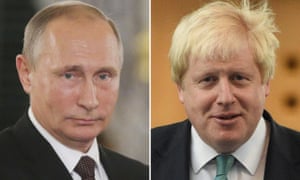
British government and British intelligence failed to prepare or conduct any proper assessment of Kremlin attempts to interfere with the 2016 Brexit referendum, according to the long-delayed Russia report.
The damning conclusion is contained within the 50-page document from parliament’s intelligence and security committee, which said ministers “had not seen or sought evidence of successful interference in UK democratic processes”.
The committee, which scrutinises the work of Britain’s spy agencies, said: “We have not been provided with any post-referendum assessment of Russian attempts at interference” – and contrasted the response with that of the US.
“This situation is in stark contrast to the US handling of allegations of Russian interference in the 2016 presidential election, where an intelligence community assessment was produced within two months of the vote, with an unclassified summary being made public.”
Committee members said they could not definitively conclude whether the Kremlin had or had not successfully interfered in the Brexit vote because no effort had been made to find out.
“Even if the conclusion of any such assessment were that there was minimal interference, this would nonetheless represent a helpful reassurance to the public that the UK’s democratic processes had remained relatively safe,” the report added.
The cross-party committee noted that publicly available studies have pointed to “the preponderance of pro-Brexit or anti-EU stories” on the Russia Today and Sputnik TV channels at the time of the vote and “the use of ‘bots’ and ‘trolls’” on Twitter, as evidence of Russian attempt to influence the process.
Committee members complained that when they asked for written evidence from MI5 at the start of their inquiry, the domestic spy agency “initially provided just six lines of text” – prompting criticism from the committee.
It accused MI5 of operating with “extreme caution” and said its “attitude is illogical” because the issue at hand was “the protection of the process and mechanism from hostile state interference, which should fall to our intelligence and security agencies”.
There was “credible open source commentary” that Russia undertook “influence campaigns” relating to the 2014 Scottish independence referendum, but despite this no effort was made to look at the Kremlin threat to British democracy until after the Brexit vote.
It was only after Russia hacked a Democratic party emails in July 2016 that any assessment appears to have been made – and the document suggests that some sort of exercise was conducted after the 2017 general election.
“Had the relevant parts of the Intelligence Community conducted a similar threat assessment prior to the referendum, it is inconceivable that they would not have reached the same conclusion as to Russian intent, which might then have led them to take action to protect the process,” the Russia report adds.
Stewart Hosie, an SNP MP who was one of only two members of the current committee who drew up the report, was scathing about Boris Johnson and Theresa May’s refusal to look at Kremlin interference in the aftermath of the Brexit vote.
“No one wanted to test this issue with a ten-foot barge pole,” he said, and added it’s an “outrage” the report wasn’t published before last December’s election. Downing Street “took its eye off the ball” over Russian threat the MP added, underestimated the response required, and is still trying to play “catch up”.
Lisa Nandy, Labour’s shadow foreign secretary, said it was extraordinary that the Prime Minister took “the political decision last October ahead of the General Election to block the publication of this important report that systematically goes through the threat Russia poses to the UK’s national security.”
No single organisation within government was prepared to take on the “hot potato” of “defending the UK’s democratic processes” the committee concluded. Britain’s spy agencies saw their job as providing “secret intelligence as context” for ministers.
Instead the job of maintaining the integrity of British democracy nominally fell to the Department for Culture, Media and Sport, “is largely confined to the broad HMG policy regarding the use of disinformation”.
Faced with Russian attempts to try to disrupt and influence British elections, the committee concluded that “It has been surprisingly difficult to establish who has responsibility for what.”
The keenly anticipated document was completed last October, but was sat on by Boris Johnson before the general election and only declassified and cleared for release by the prime minister in December.
It could not be released until No 10 had nominated Conservative members to the committee, although its nominee for chair Chris Grayling was ambushed by opposition members who voted instead for Julian Lewis.
Downing Street is expected to publish its own response shortly.
source https://www.theguardian.com/world/2020/jul/21/russia-report-reveals-uk-government-failed-to-address-kremlin-interference-scottish-referendum-brexit




0 تعليقات